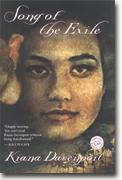Song of the Exile
Kiana Davenport
book reviews:
· general fiction
· chick lit/romance
· sci-fi/fantasy
· graphic novels
· nonfiction
· audio books
· author interviews
· children's books @
curledupkids.com
· DVD reviews @
curledupdvd.com
newsletter
win books
buy online
links
home
for authors
& publishers
for reviewers

 |
Song of the Exile Kiana Davenport Ballantine Paperback 368 pages July 2000 |
|
Kiana Davenport's Song of the Exile starts out as a love story between two young Hawaiians – Keo, a jazz musician, and Sunny, a privileged beauty of Korean-Hawaiian descent. Its footprint details three continents; an investigation into the meaning of jazz as “the tongue of the exile”; the horrors of World War II and the emergence of Hawaii’s statehood. Sunny travels first to Paris to be with Keo who journeyed there to pursue his career as a jazz musician (with a brief pit-stop in Southern United States) and then to Shanghai (without Keo) to search for her club-footed sister who was abandoned at birth by her Korean father. Keo follows Sunny to Shanghai, but the ravages of world war take over and destroy their personal quests.
The most haunting part of Song of the Exile is Sunny’s descent into perdition when she is interned as a “comfort woman” in a Japanese war camp. It encompasses several women’s experiences of absolute terror and violation during World War II -- a segment of our world history that has not as yet been fully explicated. Davenport’s searing vision and lyrical prose is at its most powerful here. She is able to capture the severity of wretchedness and shame these women and girls underwent in excruciating detail. Reading Song of the Exile is a prodigious encounter. Unlike the structure and composition of jazz, Davenport’s forays into the stories of the minor characters in the book only serve to dilute an otherwise powerful exposition on the lesser known brutalities of World War II that were experienced mainly by Asian women. *[This review refers to an unrevised edition of the book - it has not been checked against the title that is available for sale.] © 2002 by Aneesha Capur for Curled Up With a Good Book |
|
|
|
 Click here to learn more about this month's sponsor! |
|
| fiction · sf/f · comic books · nonfiction · audio newsletter · free book contest · buy books online review index · links · · authors & publishers reviewers |
|
| site by ELBO Computing Resources, Inc. | |
 The original story is diffused as characters come and go. There is Oogh, the inimitable Hawaiian-Chinese dwarf, who appears in Keo’s dreams and at various stages of his life, offering him myriad forms of assistance – even a wad of heroin, “just enough for a good night’s sleep”, when Keo is interned in a prison camp – yet, despite the little guy’s seemingly vast web of influence and reserve, he ultimately chooses to travel with rodeo boys who put him in an elevated kiosk so he can sell tickets to the crowds. We also learn somewhat about Oogh’s cunning and entrepreneurial Chinese mother in Shanghai and his illiterate Hawaiian father. Endo, a Japanese soldier, who befriended Keo and Sunny in Paris morphs into Sunny’s torturer in Rabaul and then into a blue-skinned man who is dying from lead poisoning and other corruptions of war in Hawaii where he picks up his friendship with Keo and plays jazz by his side while Sunny watches in the shadows waiting for her moment of retribution. Sunny gives birth to two children that surface and evanesce so quickly in the story, they are scarcely worth mentioning. The second part of the book suddenly gives as much weight to Keo’s sister’s story (Malia) as it does to his own.
The original story is diffused as characters come and go. There is Oogh, the inimitable Hawaiian-Chinese dwarf, who appears in Keo’s dreams and at various stages of his life, offering him myriad forms of assistance – even a wad of heroin, “just enough for a good night’s sleep”, when Keo is interned in a prison camp – yet, despite the little guy’s seemingly vast web of influence and reserve, he ultimately chooses to travel with rodeo boys who put him in an elevated kiosk so he can sell tickets to the crowds. We also learn somewhat about Oogh’s cunning and entrepreneurial Chinese mother in Shanghai and his illiterate Hawaiian father. Endo, a Japanese soldier, who befriended Keo and Sunny in Paris morphs into Sunny’s torturer in Rabaul and then into a blue-skinned man who is dying from lead poisoning and other corruptions of war in Hawaii where he picks up his friendship with Keo and plays jazz by his side while Sunny watches in the shadows waiting for her moment of retribution. Sunny gives birth to two children that surface and evanesce so quickly in the story, they are scarcely worth mentioning. The second part of the book suddenly gives as much weight to Keo’s sister’s story (Malia) as it does to his own.